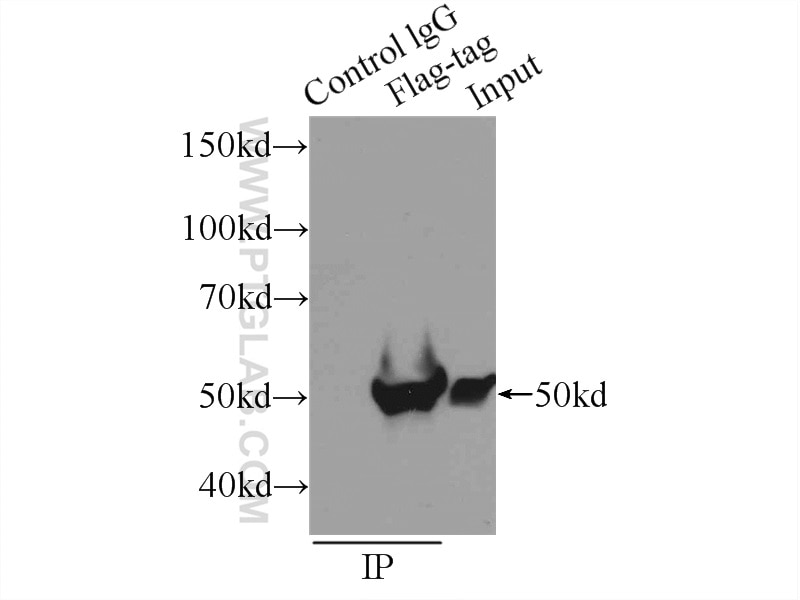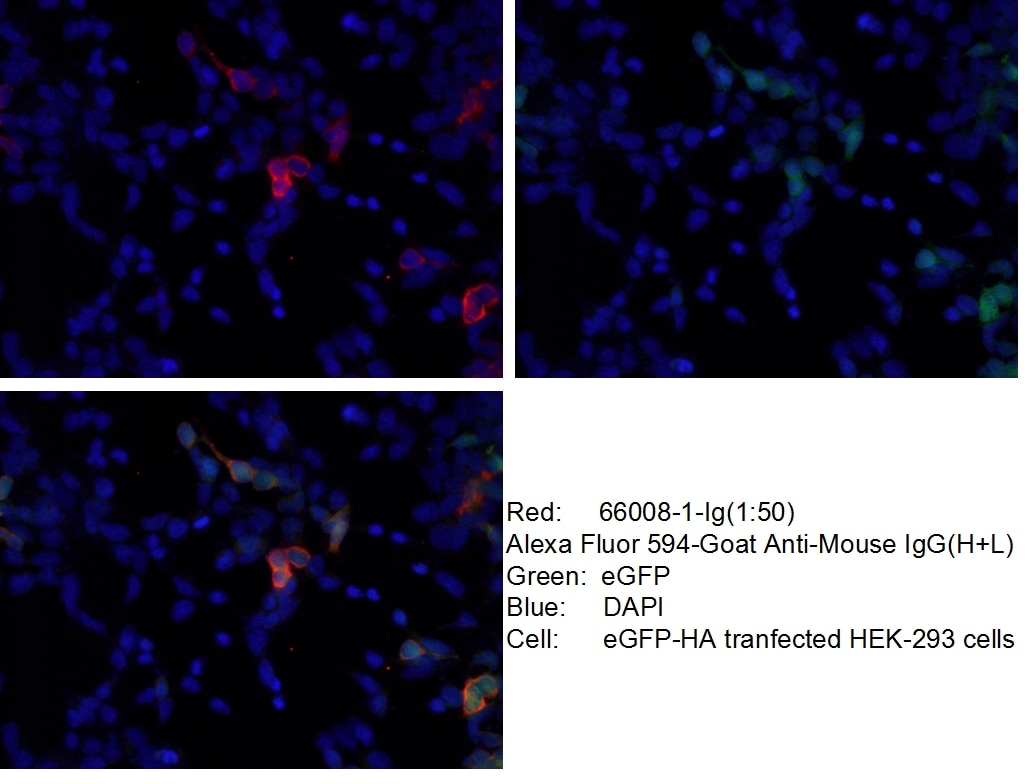Validation Data Gallery
Tested Applications
Recommended dilution
| Application | Dilution |
|---|---|
| It is recommended that this reagent should be titrated in each testing system to obtain optimal results. | |
| Sample-dependent, Check data in validation data gallery. | |
Published Applications
| WB | See 39 publications below |
| IF | See 9 publications below |
| IP | See 12 publications below |
| CoIP | See 2 publications below |
| RIP | See 1 publications below |
Product Information
66008-1-Ig targets DDDDK tag in WB, IF, IP, CoIP, RIP, ELISA applications and shows reactivity with human, mouse, rat samples.
| Tested Reactivity | human, mouse, rat |
| Cited Reactivity | human |
| Host / Isotype | Mouse / IgG2b |
| Class | Monoclonal |
| Type | Antibody |
| Immunogen |
Peptide 相同性解析による交差性が予測される生物種 |
| Full Name | DDDDK tag |
| Gene Symbol | |
| Gene ID (NCBI) | |
| RRID | AB_2881491 |
| Conjugate | Unconjugated |
| Form | |
| Form | Liquid |
| Purification Method | Protein G purification |
| UNIPROT ID | FLAGTAG |
| Storage Buffer | PBS with 0.02% sodium azide and 50% glycerol{{ptg:BufferTemp}}7.3 |
| Storage Conditions | Store at -20°C. Stable for one year after shipment. Aliquoting is unnecessary for -20oC storage. |
Background Information
DDDDK tag, also known as DDK tag, is a hydrophilic tag for recombinant protein technology with the sequence DYKDDDDK. The structure of DDDDK tag has been optimized for compatibility with the proteins it is attached to and unlikely to denature or inactivated them. For its high hydrophilic nature, the DDDDK tag is likely to be located on the surface of a fusion protein, which enables the tag more likely to be accessible to antibodies. This product is generated against 1xDDDDK tag (DYKDDDDK) and can recognize protein containing one or more DDDDK tags, no matter it is/they are located at N-terminal, C-terminal or at internal regions. The binding of this product with DDDDK tagged fusion protein does not depend on calcium ion. The clone of this monoclonal antibody hybridoma is 2C3F4, which is different from any other vendors.
Protocols
| Product Specific Protocols | |
|---|---|
| IF protocol for DDDDK tag antibody 66008-1-Ig | Download protocol |
| IP protocol for DDDDK tag antibody 66008-1-Ig | Download protocol |
| Standard Protocols | |
|---|---|
| Click here to view our Standard Protocols |
Publications
| Species | Application | Title |
|---|---|---|
Nat Microbiol Ephrin receptor A2 is an epithelial cell receptor for Epstein-Barr virus entry. | ||
Cell Metab Receptor-Mediated ER Export of Lipoproteins Controls Lipid Homeostasis in Mice and Humans. | ||
Neuron UBQLN2-HSP70 axis reduces poly-Gly-Ala aggregates and alleviates behavioral defects in the C9ORF72 animal model. | ||
Plant Cell Structural Insight into DNA Recognition by CCT/NF-YB/YC Complexes in Plant Photoperiodic Flowering. | ||
Cell Death Dis The E3 ligase TRIM26 suppresses ferroptosis through catalyzing K63-linked ubiquitination of GPX4 in glioma | ||


